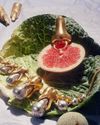Is it denim or marble? Algae or glass? How a new group of designers is resurrecting once-discarded materials.

In 2016, Sophie Rowley quit her job in London sourcing textiles for the designer Faye Toogood’s fashion line to work with a decidedly less desirable material: industrial garbage. At the Mumbai innovation center of one of India’s largest manufacturing firms, Godrej & Boyce, which produces everything from submarine parts to padlocks, Rowley joined a small team of designers tasked with catalouging every waste product the corporation produced, then recruiting local craftspeople to experiment with the discarded materials: She gave old raffia to rattan artisans, who wove it into chairs; disused copper wire went to ceramists, who crocheted it into patterns to adorn their pottery. ‘‘The quantity of waste is beyond comprehension,’’ Rowley says. ‘‘The workers were using up to 30,000 pairs of gloves each month.’’
Despite all this trash, Rowley was ultimately galvanised by the experience. After moving back home to Berlin in the summer of 2017, she started building an archive of novel materials that she’d been tinkering with earlier that decade, during her student days at London’s Central Saint Martins. At first glance, some of these experiments appeared like natural substances: a block of ‘‘coral’’ carved from discarded blue foam, recycled glass melted down and transformed into something that resembled a ghostly glacier. But her most successful project was more surreal: Bahia Denim, a sturdy textile fabricated from leftover pieces of jeans, moulded and bonded using bioresin, then cut into flat sheets that mimicked indigo-hued marble, which could later be formed into stools, tables and other furnishings. ‘‘The ultimate goal,’’ she says, ‘‘is to out-design waste.’’
この記事は T Singapore: The New York Times Style Magazine の March 2019 版に掲載されています。
7 日間の Magzter GOLD 無料トライアルを開始して、何千もの厳選されたプレミアム ストーリー、9,000 以上の雑誌や新聞にアクセスしてください。
すでに購読者です ? サインイン
この記事は T Singapore: The New York Times Style Magazine の March 2019 版に掲載されています。
7 日間の Magzter GOLD 無料トライアルを開始して、何千もの厳選されたプレミアム ストーリー、9,000 以上の雑誌や新聞にアクセスしてください。
すでに購読者です? サインイン

Look At Us
As public memorials face a public reckoning, there’s still too little thought paid to how women are represented — as bodies and as selves.

Two New Jewellery Collections Find Their Inspiration In The Human Anatomy
Two new jewellery collections find their inspiration in the human anatomy.

She For She
We speak to three women in Singapore who are trying to improve the lives of women — and all other gender identities — through their work.
Over The Rainbow
How the bright colours and lively prints created by illustrator Donald Robertson brought the latest Weekend Max Mara Flutterflies capsule collection to life.

What Is Love?
The artist Hank Willis Thomas discusses his partnership with the Japanese fashion label Sacai and the idea of fashion in the context of the art world.

The Luxury Hotel For New Mums
Singapore’s first luxury confinement facility, Kai Suites, aims to provide much more than plush beds and 24-hour infant care: It wants to help mothers with their mental and emotional wellbeing as well.

Who Gets To Eat?
As recent food movements have focused on buying local or organic, a deeper and different conversation is happening among America’s food activists: one that demands not just better meals for everyone but a dismantling of the structures that have failed to nourish us all along.

Reimagining The Future Of Fashion
What do women want from their clothes and accessories, and does luxury still have a place in this post-pandemic era? The iconic designer Alber Elbaz thinks he has the answers with his new label, AZ Factory.

A Holiday At Home
Once seen as the less exciting alternative to an exotic destination holiday, the staycation takes on new importance.
All Dressed Up, Nowhere To Go
Chinese supermodel He Sui talks about the unseen pressures of being an international star, being a trailblazer for East Asian models in the fashion world, and why, at the end of the day, she is content with being known as just a regular girl from Wenzhou.